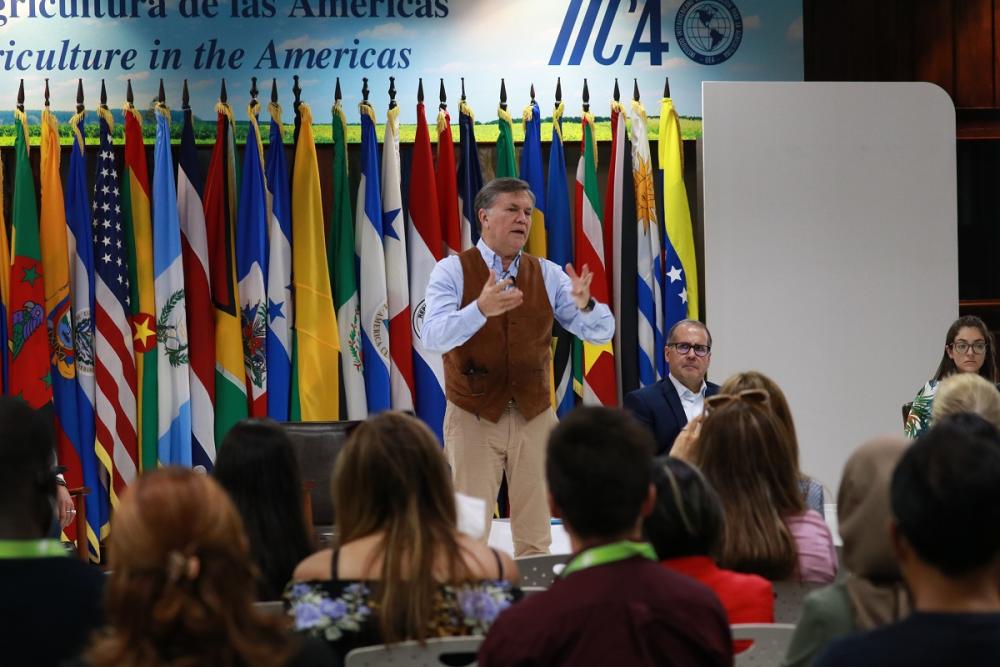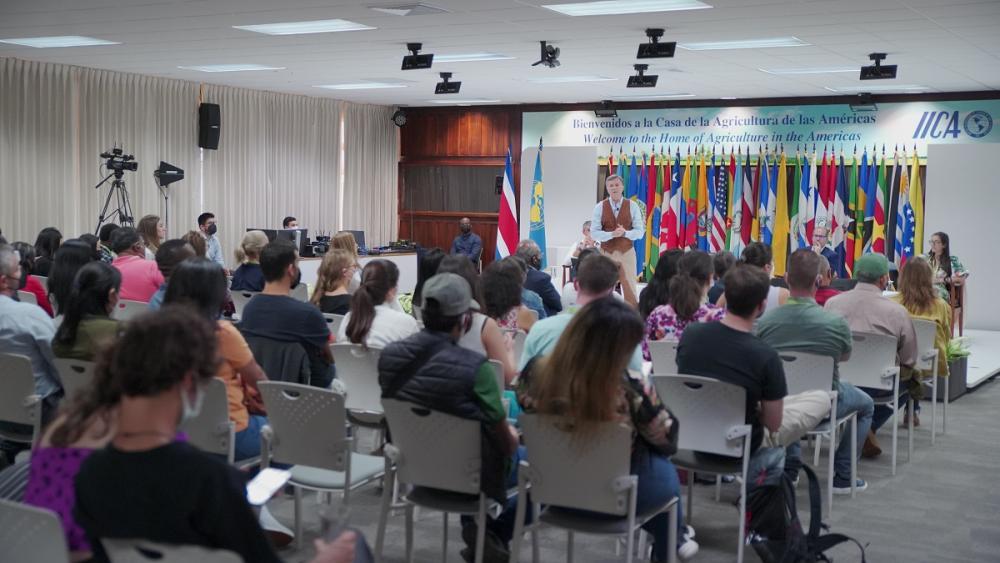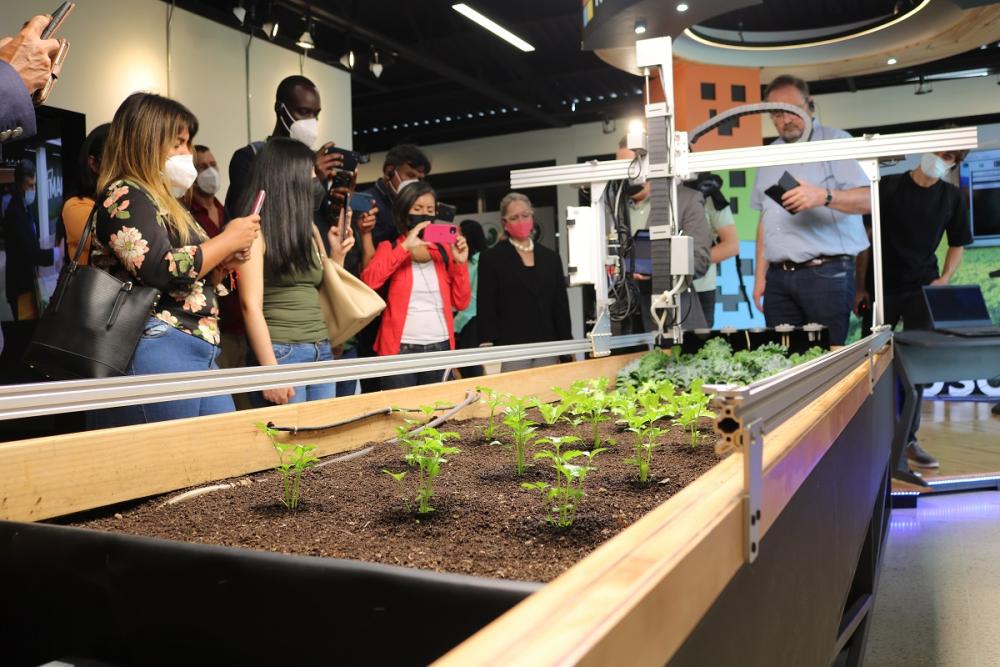Knowledge-intensive agriculture is essential for transforming agriculture and addressing global food insecurity, says IICA Director General

San José, 29 June 2022 (IICA). Knowledge-intensive agriculture is crucial for advancing in the transformation that the agricultural sector and its productive systems need, to address the numerous challenges of the current global context of concurrent crises, and tackle the issue of food insecurity that is affecting the whole world, stated Manuel Otero, Director General of the Inter-American Institute for Cooperation on Agriculture (IICA).
IICA Director General gave a talk to around 60 participants at the headquarters of this organization specializing in rural and agricultural development, in San Jose, Costa Rica, as part of the sessions for the 32nd Global Conference of the International Food and Agribusiness Management Association (IFAMA) and the dialogue with the coalition NextGen Ag Impact Network (NGIN).
IFAMA is a network that brings together business leaders, academics, students and public policy makers involved in the value chain of the food industry, who seek to solve problems common to the sector at global level.
NGIN is a global network of agriculture leaders seeking to empower young people in agriculture and farming, in order to bring about a transformative impact and fulfill the Sustainable Development Goals.
Both initiatives have the support of Bayer, a partner company of IICA.
“Knowledge-intensive agriculture offers enormous opportunities,” said Otero, adding that it enables production in adverse environments and progress in biological processes, and helps to take firm steps towards a climate-smart agriculture, towards which the world is now moving.
“Agriculture must be nutritionally-smart, socially responsible, resilient and diversified in relation to the markets. Knowledge-intensive agriculture is here to stay, supporting governments so that they can capitalize on the benefits as much as possible,” he added.
Otero stressed that it will take more than science, technology and innovation, researchers, entrepreneurs, and suitable public policies and capital to harness its potential and bring about the transformation of agriculture and agrifood systems.
“Knowledge-intensive agriculture will make it possible to farm in critical environments, where thanks to gene editing lives will be saved and progress made in the efficiency of biological processes. That is, there is an incredible new frontier of knowledge: we need more researchers, innovation, more entrepreneurs, obviously capital to continue generating companies, and the right political environments to generate virtuous circles, which is so important,” he added.

In the talk, the IICA Director General also noted the key role of the Americas in guaranteeing planetary food security, and the role of agriculture as a fundamental tool in this task, as well as for environmental sustainability, the search for peace and democratic stability.
“Today we are the most important continent in terms of food provision and we have enormous opportunities to harness knowledge-intensive agriculture. Agriculture’s time has come and we cannot allow this opportunity to go to waste. The world is watching to see what actions Latin America will take with regards to the future of agriculture, an activity that will be consolidated as the strategic center of our continent and on a global level.”
“Our continent is the largest net exporter of food in the world. Latin America and the Caribbean are responsible for 15% of all the food sold in the world, and if we include the United States and Canada, one in three tons of food comes from this continent, so we have a great responsibility. Our mission is colossal; our food must be healthy, abundant and nutritious,” he said.
Otero also mentioned that the region has qualities that make it unique, such as having “the largest reserves of water, having the most megadiverse countries on the planet” with invaluable “biological resources and great human capital with a lot to give to the world.”
At the conference, IICA Director General took the opportunity to highlight the transcendence of placing farmers at the center as essential pieces for this agricultural and rural development, in addition to the vital importance of establishing ties between the public and private sector, academia, and a number of institutions and organizations committed to this goal.

“The social and economic inclusion of our farming families is important, so that they can play a leading role in their own transformation, and know that there is a future for their families, so that rural areas are places of progress, job creation, foreign exchange, and of course it is necessary to have good practices and extension systems based on digital technologies,” he concluded.
Otero told participants that issues such as knowledge management, good agricultural practices, international trade and regional integration, innovation, bioeconomy, climate action and agricultural sustainability, territorial development and family farming, sanitation, food quality and safety, gender and youth, and the digitalization of agriculture are at the top of the cooperation agenda for IICA.
“We want IICA to be a sounding board for the agrifood sector, which is vital for the future of the sustainable development of the planet,” he said.
On their visit to IICA, the participants of the IFAMA Conference and of the NGIN dialogue were shown the projects that make up the initiative “IICA of Open Doors,” such as the Forest of the Americas, which has tree species representative of the whole hemisphere; the Typical Rural House of the Americas, which evokes the traditional agriculture and rural customs of the American continent; the Interpretative Center for Tomorrow’s Agriculture (CIMAG), an interactive space for experimenting and learning about the agriculture of the future; and the Fab-Lab, an agricultural innovation laboratory.
More information:
Institutional Communication Division.
comunicacion.institucional@iica.int